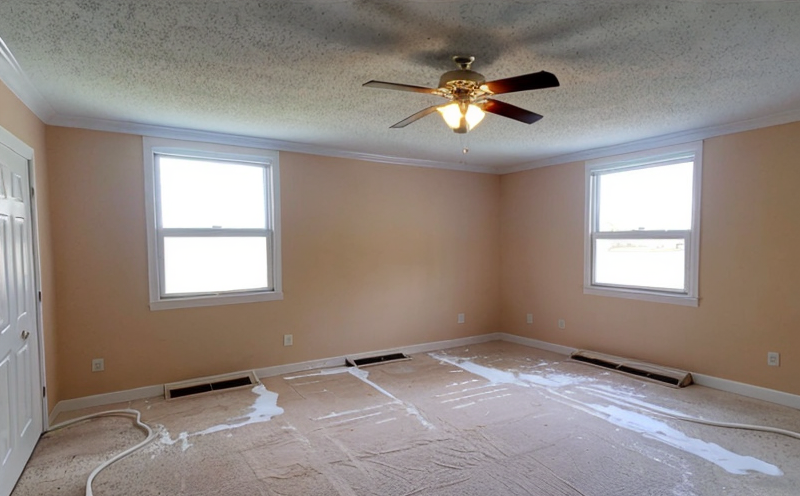ASTM E831 Thermal Expansion by Thermomechanical Analysis (TMA)
ASTM E831 is a widely recognized standard method used to measure the linear thermal expansion of materials using Thermomechanical Analysis (TMA). This testing protocol provides critical insights into how materials behave under varying temperatures, which is essential for additive manufacturing and 3D printing applications. Understanding these properties helps ensure that materials perform predictably across their intended temperature ranges.
The ASTM E831 method involves subjecting a specimen to controlled heating or cooling while measuring the resulting linear expansion or contraction. The test setup typically includes a sample holder with a precise mechanism for monitoring displacement as the sample expands or contracts in response to temperature changes. This data allows engineers and researchers to determine critical properties such as the coefficient of thermal expansion (CTE), which is crucial for predicting dimensional stability during manufacturing processes.
The precision and repeatability offered by ASTM E831 make it a valuable tool for quality assurance, compliance verification, and research and development activities. By accurately measuring CTE values across various temperature ranges, manufacturers can optimize their 3D printing parameters to ensure consistent part performance and reliability.
Thermomechanical Analysis (TMA) is particularly beneficial in the additive manufacturing sector where materials must withstand a wide range of environmental conditions. For instance, aerospace components or medical implants require precise control over thermal expansion to prevent failure under operational stress. ASTM E831 ensures that these materials meet stringent industry standards.
Furthermore, this testing method supports research into novel materials by providing detailed thermal mechanical behavior data. This information is vital for developing new alloys, polymers, and composites tailored specifically for additive manufacturing processes. Understanding how different compositions affect thermal expansion can lead to innovations in material science that enhance product performance and safety.
ASTM E831 also plays a crucial role in ensuring compliance with international regulations governing additive manufacturing technologies. Many industries have specific requirements regarding the materials used in production, and ASTM E831 helps guarantee that these materials meet those standards. This ensures not only regulatory adherence but also enhances customer confidence by demonstrating commitment to high-quality products.
In summary, ASTM E831 through TMA provides a robust framework for assessing thermal expansion properties of materials essential for additive manufacturing applications. Its ability to offer precise and repeatable measurements across broad temperature ranges makes it an indispensable tool in both quality assurance and product development efforts within this rapidly evolving field.
Benefits
The implementation of ASTM E831 thermal expansion testing offers numerous advantages, particularly for manufacturers involved in additive manufacturing processes. One key benefit is improved process control, which translates directly into enhanced product quality. By accurately measuring the linear expansion or contraction of materials under different temperatures, engineers can fine-tune their 3D printing setups to achieve optimal results every time.
- Enhanced Process Control: Accurate measurements help maintain consistent part dimensions throughout manufacturing cycles.
- Predictive Performance: Understanding how a material behaves thermally allows for better predictions about its performance in real-world conditions.
- Compliance Assurance: Ensures that materials used meet relevant industry standards, thereby satisfying regulatory requirements.
- Innovation Support: Provides valuable data that can be leveraged to innovate new materials and processes tailored specifically for additive manufacturing.
These benefits collectively contribute to more efficient production lines, higher quality end products, and increased competitiveness in the marketplace. Additionally, by adhering strictly to ASTM E831 guidelines, companies demonstrate their commitment to excellence in material science and engineering practices.
Eurolab Advantages
At Eurolab, we offer comprehensive ASTM E831 thermal expansion testing services that are unmatched by many other labs. Our state-of-the-art facilities equipped with advanced TMA equipment ensure accurate and reliable results every time. With a team of highly skilled professionals experienced in additive manufacturing applications, we provide not just tests but valuable insights into material behavior under various conditions.
Our commitment to quality extends beyond mere compliance; it encompasses innovation as well. By leveraging the latest technology and methodologies, Eurolab stays at the forefront of this rapidly developing field. We continuously invest in training our staff to stay current with industry trends and advancements so that we can offer cutting-edge solutions tailored specifically for your needs.
In addition to technical expertise, Eurolab prides itself on providing excellent customer service. From initial consultation through final report delivery, our goal is to make the testing process as seamless and efficient as possible. Our dedicated team works closely with clients to understand their unique challenges and requirements, ensuring that every project receives personalized attention.
By choosing Eurolab for your ASTM E831 thermal expansion tests, you gain access to a wealth of resources designed specifically to support additive manufacturing initiatives. Whether you're looking to optimize existing processes or explore new possibilities, our comprehensive service offerings will help drive success in your projects.





